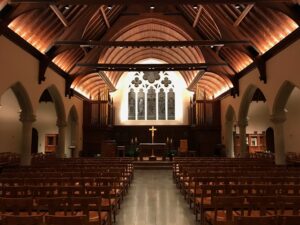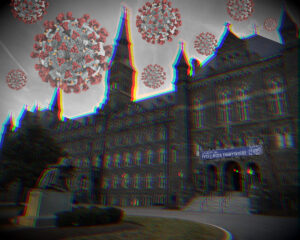This piece appears as part of our On The Pandemic column, featuring commentary about the COVID-19 pandemic from a diverse set of voices.
Last week, I finished my second year at Georgetown.
As much as I wish I could provide some eloquent update about how, despite the obstacles created by COVID-19, I made the most of this semester and learned a lot, that simply isn’t the case.
The reality is I’m tired. I’m really tired. I’m tired because I’ve spent every day for the past two months thinking about the fact that Georgetown doesn’t seem to consider me, a first-generation student, valuable.
Now, it’s not as if I’m just now figuring this out. I’ve spent the majority of sophomore year pondering the nature of my identity as a first-gen student, unable to separate this identity from my value on campus. I’ve scrutinized academia and campus norms, becoming overwhelmed by the obsession with credentials and the stress culture. It seems like this is what I am supposed to want. Now that I am at an “elite” university, I’m supposed to chase every chance at social mobility, and should lose sleep doing so. I’m supposed to pride myself on my networking abilities and my lengthy resume, even if it means sacrificing my mental health. I’m supposed to compete with my peers for scholarship opportunities and internship funding. It seems like productivity must drive my self-worth in order for Georgetown to consider me as valuable.
Unfortunately, I’m just not quite there yet.
The pandemic reminded me and many others of the truth: Georgetown was not built for students like me. When the administration announced that we needed to move out—just two days after telling us not to return to campus after Spring Break—it reminded me that any sense of stability I felt at Georgetown was the result of certain programs and initiatives that were created to support first-gen students. These programs typically take years to develop, often due to resistance from university administration.
But a pandemic meant that we didn’t have years.
We were given mere days to return to campus, pack up all of our belongings, and go back to our permanent addresses. Without clear answers, the questions ran abound: how were we supposed to store our belongings? Or suddenly pay for travel? And what about students who did not even have a home to return to? As always, these questions—and the students most affected by them—were left as an afterthought, and the first-generation, low-income (FGLI) community was forced to try and figure things out for themselves.
Within two days, I somehow managed to pack and store my belongings, organize travel, and make it from D.C. to Michigan. Then the next day, I started online classes, and the struggles I faced as a first-gen student only amplified.
I wasn’t sure how to tell my professors that doing school from my house meant I would need some extra support. For some reason, the fact that there was a global pandemic didn’t seem to be a sufficient excuse for me turning in assignments late or missing a class. I spent the first week of online classes drafting emails to my professors, trying to explain that I lacked the ability and capacity to be a full-time student at home. Both of my parents are essential workers. My brother needs someone to do school work with him. I just lost access to my mental health resources.
It felt as if I had to constantly justify my lack of engagement, as if the faculty and administration had just assumed that all students would be returning to safe and comfortable homes with stable WiFi and no added responsibilities. I didn’t understand why they expected us to jump into classes just three days after telling us to vacate campus, without giving us time to mentally and emotionally process the transition. I didn’t understand why professors expected FGLI students’ main priority to be classes without having first secured an equitable grading policy, adequate housing refunds, or payroll continuity.
The administration’s response justified a realization that FGLI students served a “need” for the university, but not one that works in conjunction with our personal wellbeing and opportunities to succeed. FGLI students are asked to be sensitivity readers and diversity tokens. We are made into admissions pamphlet statistics and heartwarming success stories, only to be met with little support during our time on campus. We are, again and again, forced to be activists to help the university fulfill its “for others” value. We might not be income sources, but we are the people who remind the administration that the only reason the university still exists is because it sold nearly three-hundred slaves to pay off its debt.
Even if the university administration does not believe they truly need FGLI students, the reality is that they do. They need us to create a campus that is more welcoming to future students, especially those from marginalized communities. They need to share our stories and to provide different perspectives. They need us in so many ways, however this need should not have to be used as a justification to receive adequate resources.
But right now, FGLI students need the university. We need the administration to understand that online learning is not accessible to everyone, and that some of us need more support than others. We need them to establish resources and a safety net before making a decision to conduct any kind of learning online, and to include FGLI students in those decision-making conversations. We need them to realize that while they may not always have the luxury of time to plan and create resources, they do right now. As the administration plans for the Fall 2020 semester, they must take the time to create resources and accommodations that accompany their decisions. Right now, they have the time to figure out how to adequately support marginalized students. There is no reason that FGLI students should be left to fend for themselves, once again.
I don’t have it in me to do this again. I don’t have it in me to approach the fall semester as if everything is normal, as if it’s a fresh start. I don’t have it in me to continually market my trauma to professors and other faculty members in order to get accomodations.
I don’t have it in me, and I shouldn’t have to. This pandemic has revealed existing structural inequities, and as the world seeks a return to “normal,” we must remember that normal isn’t good enough. A return to normal means returning to a predominantly white and upper-middle class campus that lacks adequate support and resources for marginalized students. It means returning to a campus that values credentials over mental health. It means returning to a campus where students’ worth is directly attached to their utility.
Regardless of whether the fall semester is in-person or online, students cannot be expected to ignore the global trauma that we have all endured. This not only means providing better accommodations, but completely rethinking the way we go about instructional continuity. FGLI students deserve better access to mental health services and more flexible attendance policies. We deserve equitable grading systems and greater support from faculty. We deserve to be students at this university without every aspect of our college experience being politicized.
Georgetown must do better to support its first-gen, low-income students during this pandemic. This support must continue after things return to “normal,” because even then, the current status quo isn’t good enough.







I can certainly empathize with you. In 1962 I was a FGLI student at a community college in NY. It was my only choice since I could live at home and commute while maintaining my employment. My parents were in the process of a messy divorce, I was responsible for my younger sister as well. I completed 3 semesters before I had to drop out to work because my mother was a low wage and unskilled worker. It took me years, but I did complete my education by attending classes at night. I became a Critical Care Registered Nurse and married and raised 4 children while working full time. I had to grow up fast. There were no resources for women like me at the time. Everything was a struggle. It hurt, but it made me resilient. You are bright! You made it to Georgetown! The world isn’t perfect, but it is far better than it was in 1962. Hang in there! You will cry, struggle, feel alone, but never give up on yourself and your dreams! You are worth the struggle and your children and grandchildren will benefit from your example. My oldest granddaughter is in her last year of medical school in Syracuse, NY. I was a first generation college graduate and it inspired my family to educate themselves. That made it worth the struggle! The world is a little better because I didn’t give up on myself. Whatever it takes, do it! You are worth it! – Eileen Auringer